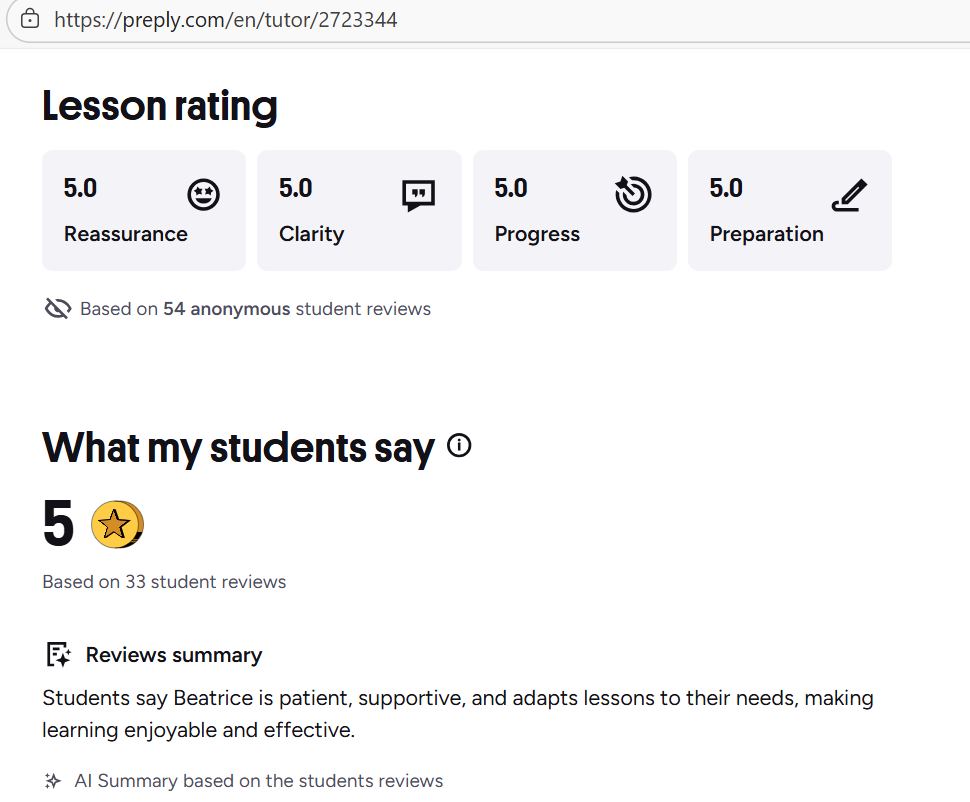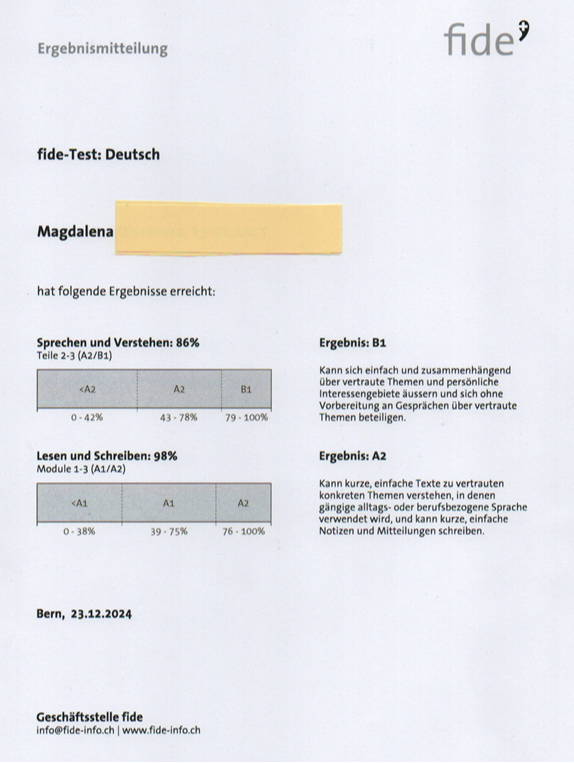Myths and Facts on the Genders of German Nouns: Der Die Das
Jul 04, 2025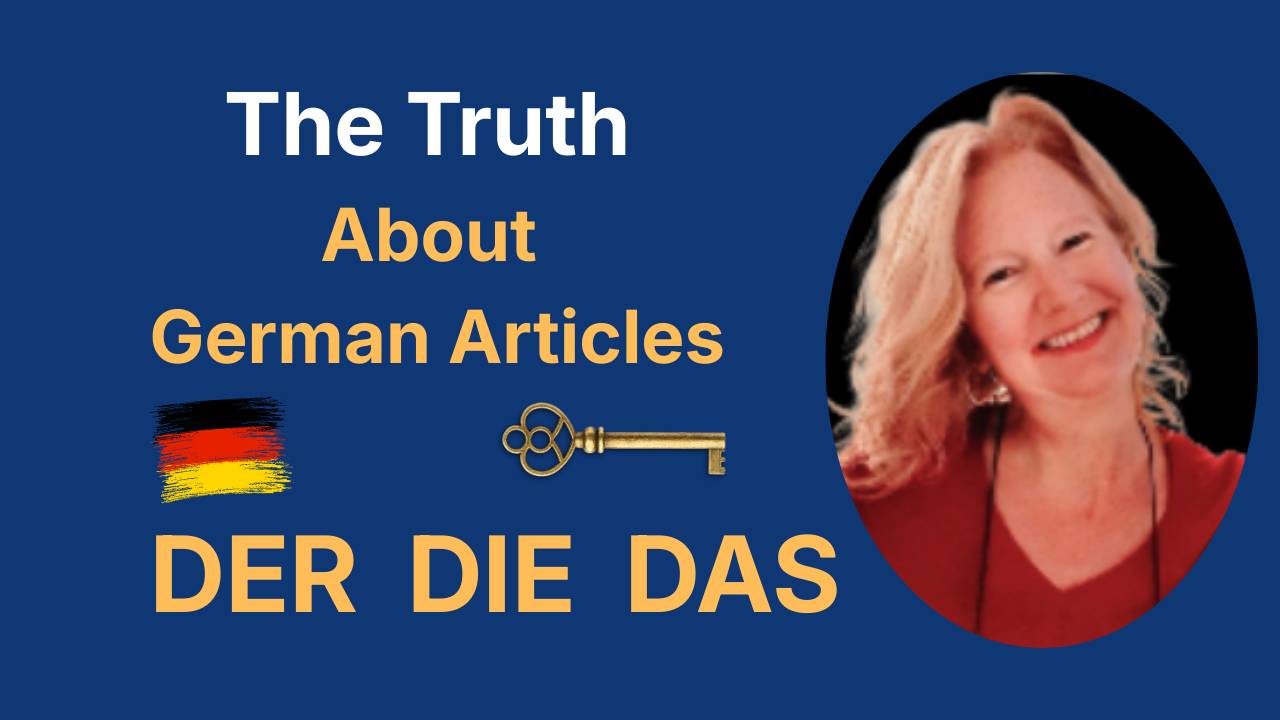
Why Do I Write This Blog About the Genders of German Nouns?
Because it is important to me that you understand the foundation of the German language well, that you can speak and write confidently, and most importantly that you enjoy learning the German language, culture, and history. 💡🎉🌟
Why Are the Genders of German Nouns Der, Die, and Das so Important?
The genders are the basics of the German language. A noun has either the gender der, die, or das. Without the genders, German sounds not correct, and you can’t really say what you want to.
However, if you know most of the genders, it’s much easier to communicate and to understand people. In the beginning it is an investment in time and effort, but it is worth the effort as it opens doors. 🚪🗝️🚪
Your future self appreciates the efforts your present self makes today. 💫
🏡 Imagine you are building a house - the genders are the foundation walls of the house. Without them, everything looks messy, uncertain and incomprehensible.
🎯 If you are an ambitious German learner who wants to learn successfully right from the start:
Understanding the genders is the first step to feeling confident
- ✅ in everyday life and while integrating in German-speaking countries
- ✅ at work
- ✅ at German exams
- ✅ and when traveling.
Make the difference, and learn the genders of German nouns properly.
Stand out at job interviews, at work, in everyday life, and when traveling.
Learning the genders of German nouns is not so difficult or overwhelming, you may think. In fact, it can be fun. 😊🎉
🎯 If you are an ambitious German learner, and you wish to revise your German skills successfully and efficiently:
Repeat and practice the basics, the genders der, die, and das, whenever you have time. Confident basic knowledge, like understanding the genders, is the key to success
- 🗝️ in everyday life and for integration in German-speaking countries
- 🗝️ at work
- 🗝️ at German exams
- 🗝️and when traveling.
If you master der, die, and das, you will not only speak correctly but also with more self-confidence. 🌟
Celebrate your small and, of course, bigger successes. 🎉
Your path to fluent German starts here!
🚀 Take action and download the free workbook DER DIE DAS in 5 Days
Myths and Facts on the Genders Der, Die, and Das
Myth: 🪄The genders of German nouns are completely random and impossible to learn.
Fact: 🎯 Some genders of German nouns may seem unpredictable; however, many follow consistent patterns based on word endings, categories, or origins. If you know these rules and learn every new word directly with the right gender, your chances are 85% instead of 33.33% of using the right gender of a German noun.
For example:
The Masculine Gender DER:
All male persons: 👨
der Mann = the man
der Sohn = the son
der Vater = the father
Endings of German nouns:
-tor, -ling, -ig, -ner, -rer , -ich, and-ismus
- -tor der Motor = the engine
- -ling der Schmetterling = the butterfly
- -ig der Honig = the honey
- -ner der Rentner = the pensioner
- -rer der Lehrer = the male teacher
- -ich der Teppich = the carpet
- -ismus der Optimismus = the optimism
Endings of male German professionals: 👨 🛠️ -loge, -eur
- -loge der Geologe = the geologist / der Archäologe = the archaeologist
- -eur der Friseur = the hairdresser / der Installateur = the plumber
All cardinal points are masculine: 🧭
der Norden = the north
der Süden = the south
der Westen = the west
der Osten = the east
The Feminine Gender DIE:
All female persons, except for Mädchen (girl) are feminine and have the gender DIE: 👩
die Frau = the woman
die Mutter = the mother
die Tochter = the daughter
Das Mädchen has the ending -chen and therefore the article is “das” and not “die”.
Die Mädchen are the plural of Mädchen. 👩 👩
For example: die zwei (2) Mädchen = the two girls.
Ending of female German professionals or female persons: 👩 🛠️ -login, -erin and -in
- -login die Archäologin = the female archaeologist
- -erin die Lehrerin = the female teacher
- -in die Amerikanerin = the female American
Most fruits : 🍇
die Traube = the grape
die Erdbeere = the strawberry
die Zitrone = the lemon
die Kirsche = the cherry
but = aber der Apfel = the appel
The Neuter Gender DAS:
das Kind = the child 👶
das Tier = the animal 🐕
Endings of German nouns: -chen, -lein, -ment, -eum and -ium
- -chen das Gärtchen = the small garden
- -lein das Büchlein = the small book
- -ment das Instrument = the instrument
- -eum das Museum = the museum
- -ium das Studium = the accademic studies
All verbs when they are used as nouns:
schwimmmen = to swim / das Schwimmen = the swimming
Das Schwimmen ist gut für die Gesundheit. = Swimming is good for health.
lesen = to read / das Lesen = the reading
Das Lesen ist interessant. = Reading is interesting.
lernen = to learn / das Lernen = the learning
Das Lernen macht Spass (Spaß)* = Learning is fun.
*Spass = fun - In Switzerland Spass is written with two s.
*Spaß = fun – In Germany Spaß is written with ß.
Often, words that begin with the letters Ge-:
das Gemüse = the vegetable
das Getreide = the cereal
das Geschenk = the gift
das Getränk = the drink
das Geheimnis = the secret
but = aber die Geschichte = the story, the history
Often, words from other languages than German:
das Auto = the car
das Handy = the cellphone, the mobile phone
das Thema = the topic
das Sofa = the couch
das Internet = the internet
but = aber der Computer = the computer
The plural of German nouns always has the gender DIE, even if the noun is masculine or neuter in the singular. 😊 😊😊
die Frau = Singular = the woman 👩
die Frauen = Plural = the women 👩 👩
der Mann = Singular = the man 👨
die Männer = Plural = the men 👨 👨
das Kind = Singular = the kid/the child👶
die Kinder = Plural = the kids/the children 👶 👶
Myth: 🪄Learning the genders is so difficult and overwhelming.
Fact: 🎯 It does not have to be overwhelming. Learn focused German for ten to fifteen minutes each day.
- Learn the masculine gender DER on the 1st evening.
- Learn the feminine gender DIE on the 2nd evening.
- Learn the neuter gender DAS on the 3rd evening.
- Learn the plural, always with the gender DIE, on the 4th evening.
- Repeat what you learned on the 5th evening and thereafter whenever and wherever you have time.
Learn a new noun, always with the right gender.
Use colors:
Blue for masculine genders: der Baum = the tree
Red for feminine genders: die Blume = the flower
Green for neuter genders: das Haus = the house
Black italic or black underline for the plural, always with the article die: die zwei Autos = the two cars 🚘🚘
If you want to go deeper and make the quick win of the free 5-Day Workbook into sustainable, lasting learning of Der Die Das check out my online course.
👉Der Die Das in 7 Days - The Fast Track to Gender Confidence 🎯🧘♀️
Testimonials from Customers I Supported in Their German Learning Journey: 🎯🎉💫
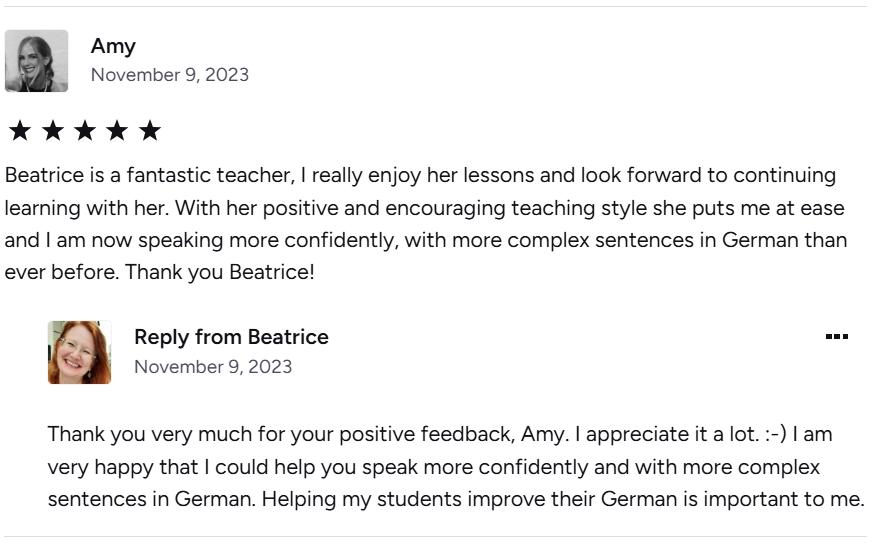
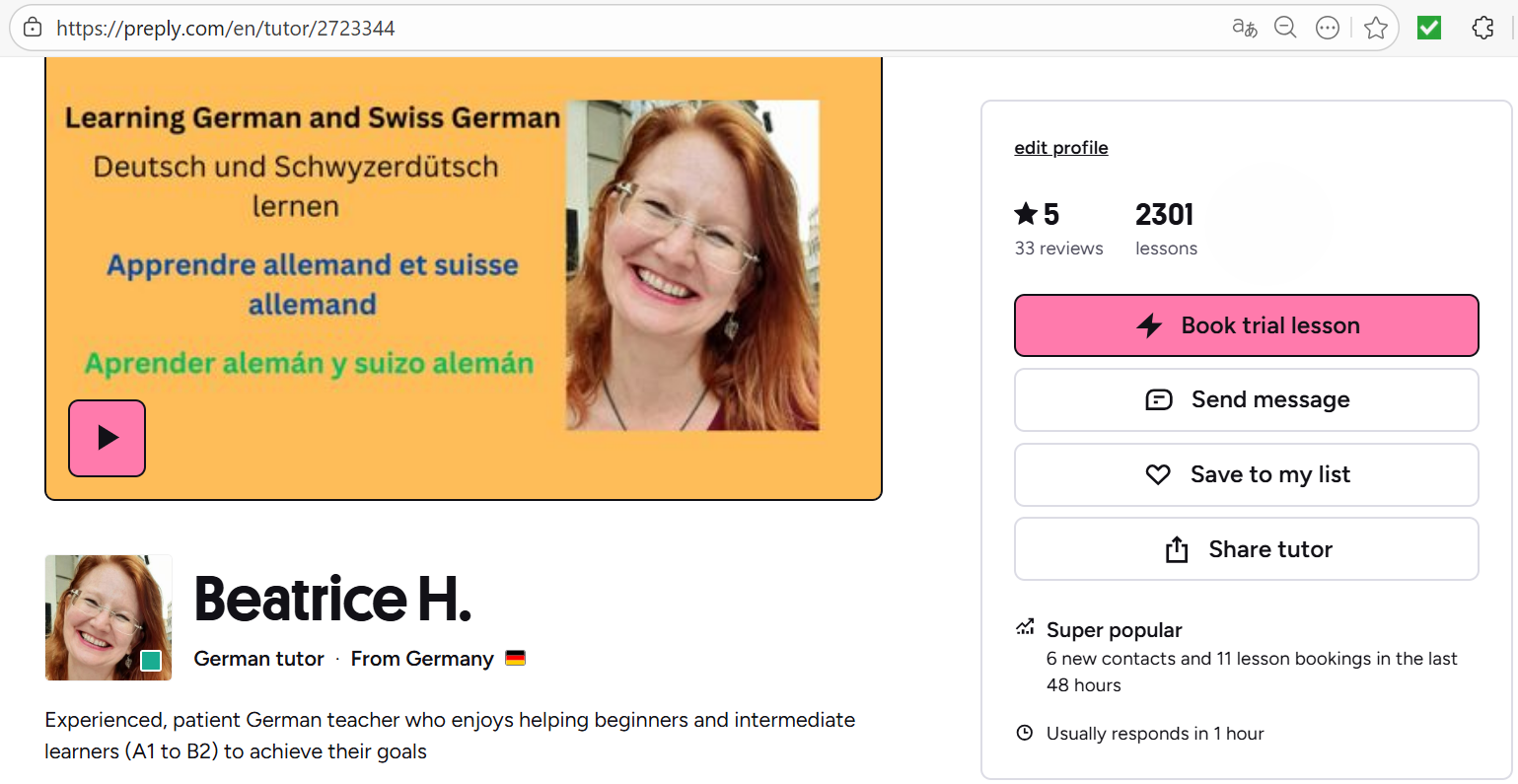

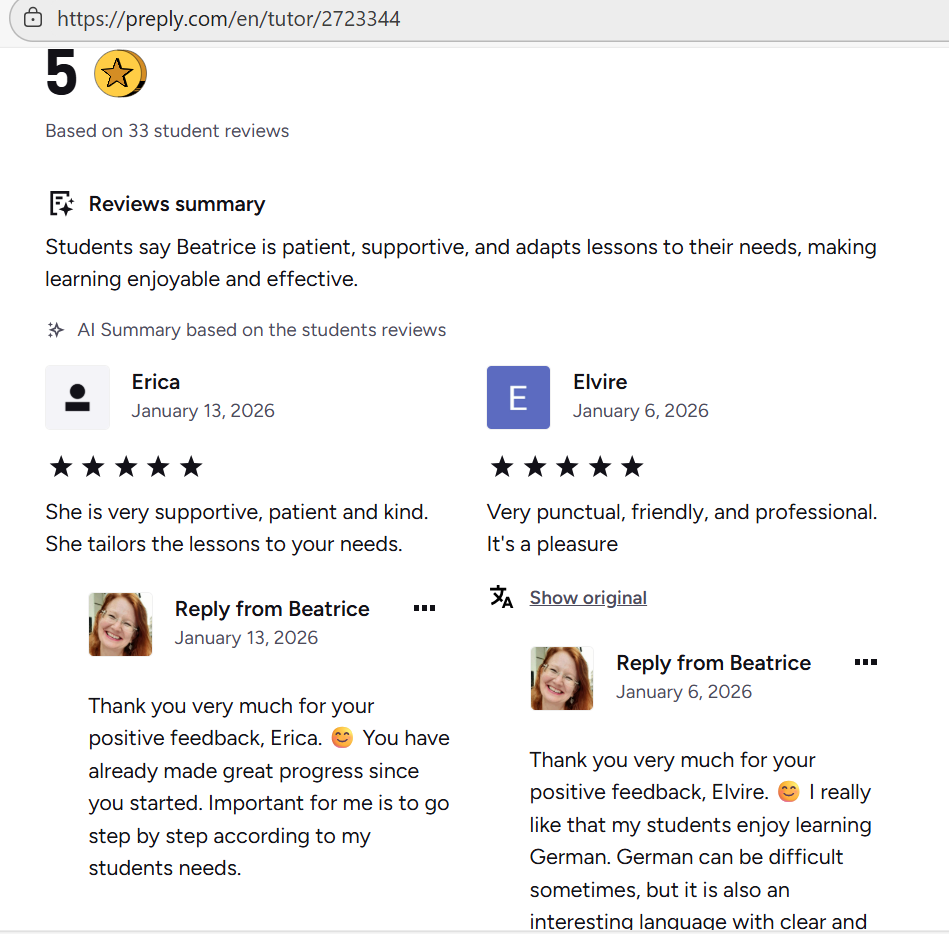
2 ambitious German learners who purchased
Der Die Das in 7 Days - The Fast Track to Gender Confidence 🎯🧘♀️
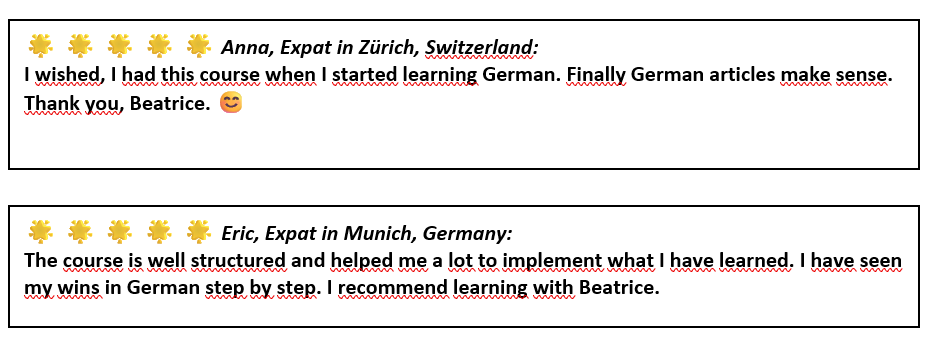
The Method Behind My Students' Successes:🎉💫
Learning German can be calm, focused, and truly enjoyable — when you have the right roadmap, mindset, and support.
One of the biggest challenges for German learners is mastering der, die, das.
That’s why I created
Der Die Das in 7 Days — The Fast Track to Gender Confidence 🎯🧘♀️
It’s the same proven method I use with my students to help them learn efficiently, sustainably, and with calm focus.
Here’s what you’ll get:
- ☑️ Proven insider tips for learning der, die, das in just 7 days.
- ☑️ Clear, simple explanations in both German and English.
- ☑️ 10 practical exercises (with solutions and explanations) to build confidence.
- ☑️ A mindful meditation video to support relaxed, focused learning.
- ✅ Bonuses: 20 useful nouns, a secret learning strategy, a checklist to keep you on track, and a little introduction into the Swiss German articles de, t, and s (der, die, and das).
🎯 Save time, money, and energy while learning smarter — not harder.
Your Own Success Story Starts Here 💫🎉😊
With the right roadmap, motivation, and mindset, you can achieve your German goals — whether that’s passing your exam, landing a job, or simply feeling at home in everyday conversations.
Start small, stay consistent, and celebrate your progress.😊
As the famous German writer Johann Wolfgang von Goethe once said:
✨„The greatest thing in this world is not so much where we stand, as in what direction we are moving.„ ✨ - Johann Wolfgang von Goethe
Every word you learn brings you closer to confidence. ✨
Keep Learning with Me
For more weekly tips on learning German with clarity and calm, subscribe to my free newsletter below.
📩You’ll get exclusive advice on der, die, das, German grammar, and smart learning strategies — straight to your inbox.
#LearnGendersOfGermanNouns #LearnDerDieDas #LearnGermanGrammar #LearnGermanForExpats #LearnGermanFast
Your data are treated confidently, and only used by Deutsch A Beatrice.







